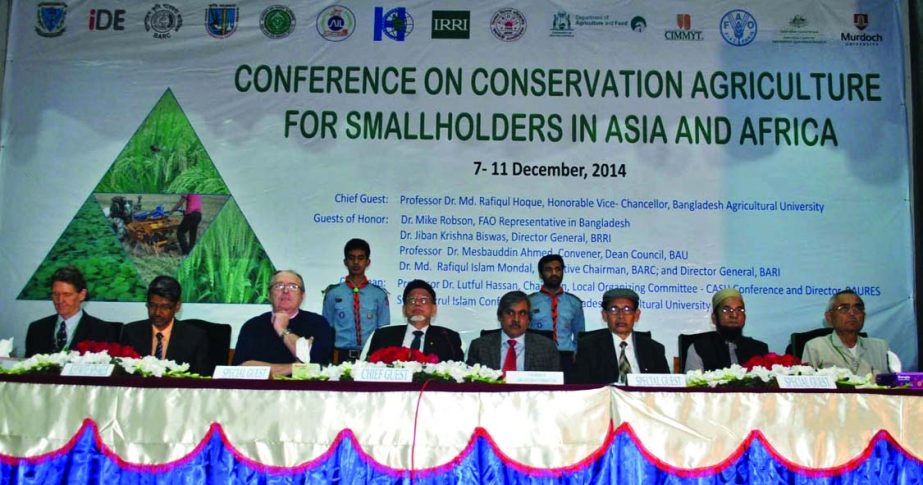
Business Desk :
A five-day long conference on “Conservation Agriculture for Smallholders in Asia and Africa” has started at Bangladesh Agricultural University (BAU) in Mymensingh from 8-11 December.
. BAU Vice-Chancellor Prof Dr Md Rafiqul Hoque inaugurated the conference as chief guest while Prof Dr Lutful Hassan, Director, BAURES, Chairman of Local Organizing Committee, presided over the conference, says a press release.
Prof Dr Mesbauddin Ahmed, Convener, Dean Council of BAU, Prof Dr Richard W Bell, Murdoch University Australia, Prof Dr Amir Kassam, University of Reading, UK, Dr Jiban Krishna Biswas, Director General of Bangladesh Rice Research Institute and Dr Mike Robson, FAO representative in Bangladesh were the guests of honour.
As many as 14 organizations including BAU, IDE-Bangladesh, Murdoch University, FAO, Australian Centre for International Agricultural Research (ACIAR), BARC, BARI and BRRI sponsored the conference.
The chief guest Prof Dr Md Rafiqul Hoque said, over the last decade, research in Bangladesh has demonstrated that conservation agriculture practices could have a major role in adapting various cropping pattern and changing climate, resisting to declination of groundwater levels and overcoming scarcity of farm labour and rising costs of production through mechanization. The government of Bangladesh is also very pleased to note that conservation agriculture has water saving benefits as well as cost savings.
The scientists opined, while conservation agriculture covers 157 million hectares globally it has mostly been a system adopted by large farmers with heavy machinery, only a small percentage of conservation agriculture is practiced in Asia and Africa.
In Bangladesh, effort has been undertaken to develop minimum tillage for small farms for 20 years, the adoption of full conservation agriculture on farms is still limited.
This conference is timely so that it can be understood what has been learnt to date on conservation agriculture for smallholder farmers, what bottlenecks exist to greater adoption and how to engage smallholder farmers, researchers, and the private sectors in overcoming these bottlenecks.
The participating scientists will be able to learn from the experiences with development of conservation agriculture for smallholders in Brazil, Africa and elsewhere in Asia.
Later, guests were visited different stalls arranged by different national and international organizations for the fair.
About 150 participants from 19 countries were taken part in it.
A five-day long conference on “Conservation Agriculture for Smallholders in Asia and Africa” has started at Bangladesh Agricultural University (BAU) in Mymensingh from 8-11 December.
. BAU Vice-Chancellor Prof Dr Md Rafiqul Hoque inaugurated the conference as chief guest while Prof Dr Lutful Hassan, Director, BAURES, Chairman of Local Organizing Committee, presided over the conference, says a press release.
Prof Dr Mesbauddin Ahmed, Convener, Dean Council of BAU, Prof Dr Richard W Bell, Murdoch University Australia, Prof Dr Amir Kassam, University of Reading, UK, Dr Jiban Krishna Biswas, Director General of Bangladesh Rice Research Institute and Dr Mike Robson, FAO representative in Bangladesh were the guests of honour.
As many as 14 organizations including BAU, IDE-Bangladesh, Murdoch University, FAO, Australian Centre for International Agricultural Research (ACIAR), BARC, BARI and BRRI sponsored the conference.
The chief guest Prof Dr Md Rafiqul Hoque said, over the last decade, research in Bangladesh has demonstrated that conservation agriculture practices could have a major role in adapting various cropping pattern and changing climate, resisting to declination of groundwater levels and overcoming scarcity of farm labour and rising costs of production through mechanization. The government of Bangladesh is also very pleased to note that conservation agriculture has water saving benefits as well as cost savings.
The scientists opined, while conservation agriculture covers 157 million hectares globally it has mostly been a system adopted by large farmers with heavy machinery, only a small percentage of conservation agriculture is practiced in Asia and Africa.
In Bangladesh, effort has been undertaken to develop minimum tillage for small farms for 20 years, the adoption of full conservation agriculture on farms is still limited.
This conference is timely so that it can be understood what has been learnt to date on conservation agriculture for smallholder farmers, what bottlenecks exist to greater adoption and how to engage smallholder farmers, researchers, and the private sectors in overcoming these bottlenecks.
The participating scientists will be able to learn from the experiences with development of conservation agriculture for smallholders in Brazil, Africa and elsewhere in Asia.
Later, guests were visited different stalls arranged by different national and international organizations for the fair.
About 150 participants from 19 countries were taken part in it.

